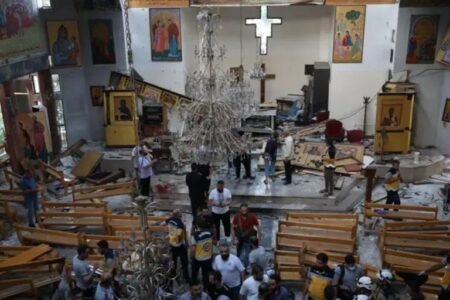The President of Nigeria, Bola Tinubu, on Sunday, ended his tenure as the Chairperson of the Economic Community of West African States Authorities of Heads of State and Government, ECOWAS.
Following the end of Tinubu’s administration, the President of Sierra Leone, Julius Bio, emerged as his successor.
Tinubu announced this at the 67th Ordinary Session of the Authority at the Aso Rock Villa, Abuja.
He said, “It has been a profound honour and privilege to lead this esteemed body, and I remain deeply humbled by the trust and support you have extended to me throughout my channel as I now hand over the mantle of leadership to my great friend and dear brother, His Excellency, President Julius Bio of Sierra Leone.
“I do so with a deep sense of fulfilment and of commitment for the future of West Africa.”
Before handing over to the new ECOWAS president, Tinubu expressed concern over the slow pace of activating the ECOWAS Standby Force and urged West African leaders to move swiftly from concept to reality in the collective fight against terrorism and transnational crimes.
“I am a little bit worried about the slow pace of its (ECOWAS Standby Force) activation, which is taking longer than desired,” the president said in his opening speech.
Tinubu first proposed the formation of a regional standby force and a counter-terrorism centre in April 2024 in order to reduce terrorist activity in Africa’s most difficult regions.
He stated that the counterterrorism centre would serve as a nexus for intelligence sharing, operational coordination, and capacity building across Africa.
The Nigerian leader described ransom-taking and illicit mining as “evil branches” that are fuelled by “root causes” such as poverty, inequality, and social injustice, and that finance, re-equip, and re-supply terrorist networks across the continent.
“Key to our collective efforts against terrorism is the urgent need for a fully operational Regional Counter-Terrorism Centre,” Tinubu told heads of state and senior government officials at the African High-level Meeting on Counter-Terrorism in Abuja on April 22, 2024.
Two months later, at the African Union’s sixth Mid-Year Coordination Meeting in Ghana, he announced that ECOWAS was looking into new funding options for its $2.6 billion Standby Force.
In August of that year, he reaffirmed member nations’ commitment to investing in the force, citing it as the solution to terrorism in the Sahel.
One year later, Tinubu, who delivered an account of his two-year chairmanship of the block beginning in July 2023, voiced unhappiness with the pace of the effort as security worries in the Sahel grew.
He emphasised the importance of operationalising the force in the face of rising instability in the sub-region.
“The ECOWAS Standby Force must move from concept to operational reality. I am a little bit worried about the slow pace of its activation, which is taking longer than desired,” the president said.
He mentioned that threats confronting the region were transnational, driven by agile and dangerous networks that respected nobody’s border.
“No single nation can, therefore, address these challenges alone. We must strengthen coordination, amplify political will, and prioritise a collective approach to secure it,” he added.
Tinubu highlighted major milestones during his leadership of the regional bloc.
He stated that the completed ECOWAS Military Logistics Depot in Lungi, Sierra Leone, would play a critical role in providing equipment and other logistics to forces deployed by ECOWAS.
“Last February in Addis Ababa, Nigeria signed the Sixth Agreement with the African Union. With the depot’s completion, Nigeria is committing itself to sea-lift and air-lift arrangements with ECOWAS,” he said.
Tinubu expressed optimism that ongoing diplomatic engagements with Burkina Faso, Mali, and Niger would eventually lead to their return to the community.
“Under my chairmanship, I deployed all diplomatic means to engage and dialogue with our brothers in Burkina Faso, Mali, and Niger. I am confident that before too long, they may return to the family,” he said.
Tinubu called for deeper economic cooperation, empowering the private sector, and removing trade barriers to unlock West Africa’s potential.
“Our intra-regional trade remains low, even as we possess the potential to be an economic powerhouse. We must create the enabling environment, empower the private sector, and create the conditions necessary for innovation to flourish,” he said.
He advocated the rapid implementation of critical regional infrastructure projects such as the West African Gas Pipeline, West African Power Pool, and Abidjan-Lagos Corridor Highway as accelerators for growth and integration.
Following the transition, President Bio praised Tinubu for establishing a good platform for regional cooperation, economic development, and peacebuilding.
“I am humbled to build upon the strong foundation you have established,” he said, thanking President Tinubu for his “experience and leadership”.
The Sierra Leonean leader acknowledged the intricacies of the current situation, stating that West Africa was at a crossroads, dealing with terrorism, illicit arms flow, political instability, and transnational crime, notably in the Sahel and coastline regions.
“The democratic space is under strain in parts of our region. In some countries, the constitutional order has been disrupted.
“Yet, across West Africa, citizens—especially our youth—are demanding not just elections, but also accountability, transparency, and a fair stake in national life,” he said.









